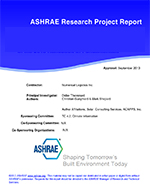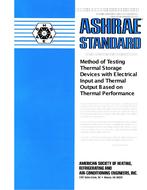Alternative wall systems are frequently evaluated by comparing steady-state heat transmission coefficients, such as U- and R-values. Steady-state transmission coefficients do not adequately describe thermal performance under dynamic temperature conditions. Laboratory results of building envelope components tested under steady-state and dynamic temperature conditions can be used to develop methods of more accurately predicting heat losses and gains to the building envelope.
The thermal characteristics of 21 wall assemblies, including different types of masonry and wood-frame walls and two standard calibration assemblies, have been measured using a calibrated hot box in general accordance with ASTM C976. Results presenting steady-state, transient, and periodic performance have been assembled in two manuals.
This paper summarizes the results. Steady-state values are used to obtain average heat transmission coefficients such as U- and R-values, and the measured values are compared to those calculated from material properties. The transient and periodic dynamic tests provide data on thermal performance under controlled conditions that simulate actual temperature changes in building envelopes. Measured results are compared to values predicted by steady-state analysis. The difference between measured and predicted results is shown to be due in general to thermal storage capacity of the assembly.
Units: Dual
Citation: Symposium, ASHRAE Transactions, 1986, vol. 92, pt. 2B, Portland, OR
Product Details
- Published:
- 1986
- Number of Pages:
- 20
- File Size:
- 1 file , 1.6 MB
- Product Code(s):
- D-PO-86-12-5


